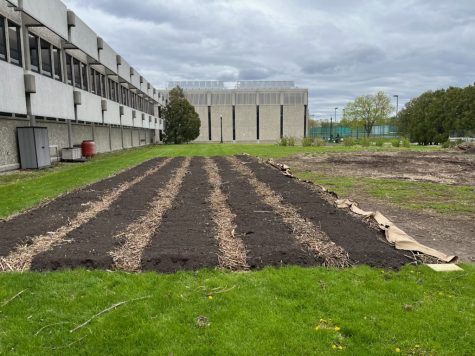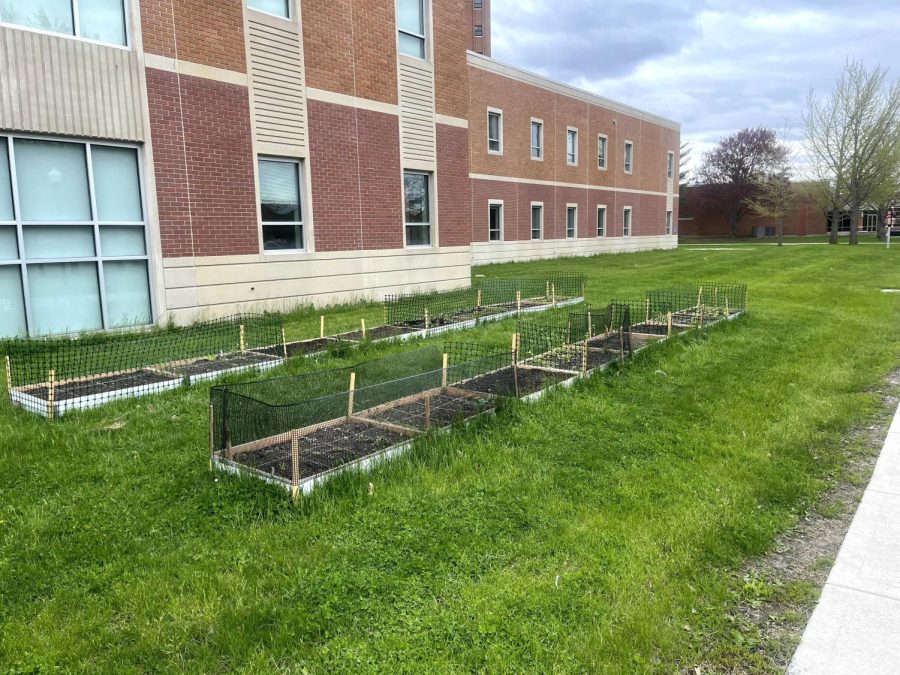Edible Campus to promote sustainability
Recently built garden beds near the Stevens Building. 100 new gardens beds have been built as part of the Edible Campus initiative.(Michael Mollsen | Northern Star)
May 2, 2023
DeKALB – A new campus initiative called Edible Campus plans to make fresh produce readily available for students, faculty and staff on campus.
The project has several goals, such as addressing food insecurity, educating on sustainable food systems, creating opportunities for research and promoting healthy eating and lifestyles.
It will be funded by Sen. Dick Durbin’s office which provided $500,000 to NIU’s Division of Outreach, Engagement and Regional Development, which will fund the next 3 years of the project.
Bryan Flower, associate director of food systems innovation, has been helping with the project. Flower is also a chef and farmer who owns land in Northern Illinois.
“My wife and I, we purchased a 12 acre farm,” Flower said. “We raise grass fed beef, we raise pigs, chickens, goats. So, you know, transitioning to this project and creating food on campus was just a natural path for me.”
100 garden beds were installed on campus as part of the Edible Campus initiative and they have already begun building a market garden next to Anderson Hall. Also, there are plans to build indoor aeroponic and hydroponic grow systems and to create “Food Forests,” which will include berry bushes and fruit and nut bearing trees.
“The goal of those (garden beds) is a pick as you go, kind of, as students are walking past them, if they see something that’s ripe, they can harvest it, take it with them, faculty staff the same,” Flower said.
The market garden near Anderson Hall will eventually be growing between 10,000 to 20,000 pounds of food.
“Campus dining will be purchasing anything that we grow to put in that salad bowl program in the dorms,” Flower said. “Secondly, we will be putting food from this garden into the Huskie Pantry to ensure that they have a consistent outlet of fresh produce.”
The food will also be used in the project’s new meal prep program.
“They (students) can prepare meals in advance, put them into microwavable safe containers, take them with them and in their dorms where there’s only a microwave, right? They can pop those in, heat those up,” Flower said.
Flower also coordinated seed donations from local high schools and donations of other tools and products from numerous businesses, including the Ball Horticultural Company, Gordon Hardware and Garden Prairie Organics.
Courtney Gallaher, NIU’s sustainability coordinator, said Edible Campus is part of a bigger sustainability plan to try and decarbonize the campus.
“We’re looking at things like how do we transition to renewable energy? How do we make our buildings more energy efficient? How do we conserve water?” Gallaher said. “And then the social side of sustainability, how do we do better in terms of teaching and engagement to community outreach around issues like environmental justice, and helping students see the relationships between all these other things happening in their community and climate change or biodiversity loss?”
Gallaher said the social side of sustainability, such as teaching about sustainability and community outreach surrounding environmental justice, will also be important to consider.
Gallaher and Flower as well as other faculty, volunteers and some paid students have come out to participate in workdays where they build garden beds, plant seeds and move dirt.
Alyssa Edwards, a graduate student in the earth, atmosphere and environment department, was at last Friday’s workday. Edwards has been part of the Edible Campus since it was in the idea phase.
“I’m pretty much in charge of volunteers and getting those things together, like getting calendar documents together, things like that,” Edwards said. “But apart from the logistics side of Edible Campus, I’m also like doing my whole dissertation research on it.”
Volunteers also came out to the workday to help progress the Edible Campus project.
Madison Payne, a graduate student in the earth, atmosphere and environment department, was helping build the garden next to Anderson Hall.
“I think it really helps with the community,” Payne said. “And I feel like having stuff outside of the classroom is really good to just get to know people.”
The Edible Campus initiative is currently building their website where they will begin reaching out for volunteering opportunities which will be coming soon.




